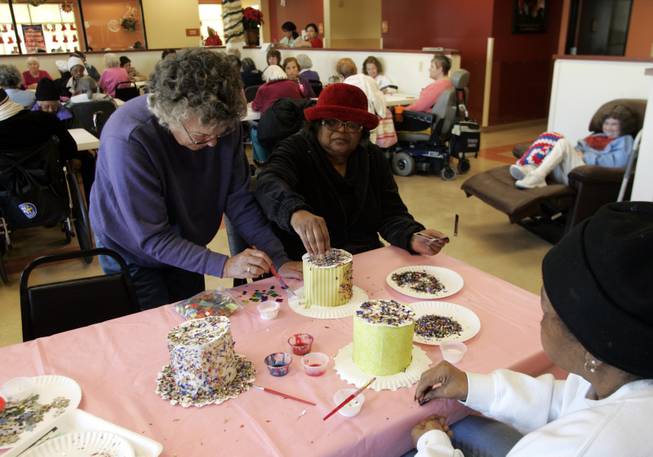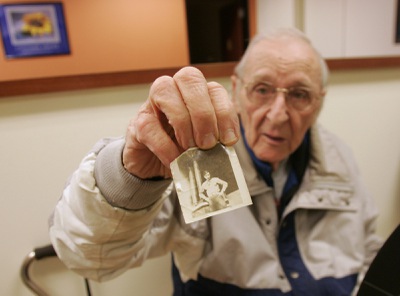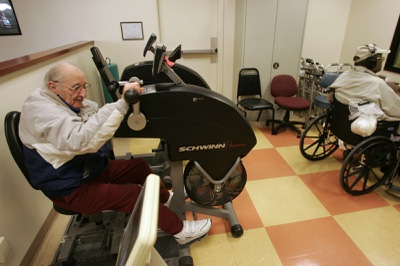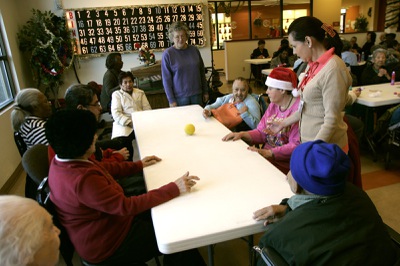
Betty Pone helps client Jan Moore work on decorations for New Year’s Eve at Nevada Adult Day Healthcare Center, one of three in the valley.
Sunday, Jan. 3, 2010 | 2 a.m.
Related content
- Seniors worry about Medicare Advantage cuts (12-28-2009)
- If an industry is immune to recession, it’s health care (2-24-2009)
- Nevada's aging population not as old as other states (2-23-2009)
- Older workers ‘bumping’ young down jobs ladder (1-6-2009)
- Retire? Not me (3-15-2008)
- Seniors find additional school support taxing (9-24-2006)
The U.S. Census Bureau projects that the fastest-growing segment of Nevada’s population over the next 10 years will be senior citizens, and the prospect has policymakers on edge.
They fear Nevada’s aging population will put an unbearable strain on the state’s overburdened health care system and social services and create greater urgency to build affordable housing. And given the state’s current fiscal crisis that has forced agencies to cut programs and freeze vacant positions, the concerns about the graying of the Silver State are valid.
The Las Vegas Valley, for example, has a shortage of services such as those at three Nevada Adult Day Healthcare Centers.
For the past three years, Josephine Leu, 59, has been among the many people who have spent most weekdays at the centers. Leu hopes to be able to do that through this decade. A stroke left her unable to work. She has to use a wheelchair.
“If I didn’t come here,” she says, “I’d be staying at home, and my daughter would be taking care of me all day. She already has her own children to take care of.”
At the center she is able to socialize, get a little exercise using a walker and eat under the supervision of a nutritionist.
Taxpayers foot the costs for 80 percent of the center’s clientele.
‘Demographic tsunami’
From 2010 to 2020, Nevada is expected to see a 61 percent increase in residents 65 or older, trailing only Alaska and Arizona. If that Census projection holds true, Nevada will have 531,120 people past the traditional retirement age in 2020. That’s more than four times the 127,631 such Nevadans in 1990.
The iceberg’s tip poked through in a snapshot of 2008. Although Nevada’s population grew 1.4 percent that year, the number of residents 65 and older increased 3.9 percent, the Census Bureau estimated.
But red flags were raised at least one year earlier. UNR’s Sanford Center for Aging reported in 2007: “Nevada’s infrastructure of services for older adults is unprepared for the demographic tsunami which will occur as the Baby Boomer population ages.”
And that warning was sounded before the state’s economy cratered, before Nevada was saddled with one of the worst state economies in the nation — one expected to be among the last to fully recover.
Because they were based on rates of growth before the recession, the census projections may be off, but even if they are, Nevada can still expect to have a far greater number of seniors 10 years from now than today.
State Demographer Jeff Hardcastle says the main reason is middle-aged workers flocked in droves to the state in the 1990s. Many, if not most, put down roots, so they are expected to spend their final decades here.
Another factor, at least until the state’s economy is thriving again, will be younger people leaving the state to find work.
The lack of jobs is not a deterrent to Baby Boomers looking for a place to retire, however. Nevada can expect an influx of those folks because they’re attracted by the tax structure and lack of a state income tax, says Dennis Smith, president of Home Builders Research.
On average they are also better positioned to take advantage of the valley’s “deeply discounted” home prices than other age groups, says Brian Gordon, principal with Applied Analysis, a Las Vegas financial advisory firm.
“They seem more capable of paying cash or making a significant down payment on a home,” Gordon says.
So many of those retirees might just provide the state with an economic shot in the arm.
Gray issues
Thanks to strength in numbers, seniors can look forward to wielding considerably more political clout because they historically vote in higher percentages than other adults.
“I say watch out,” says Pamela Powell, an educator with University of Nevada Cooperative Extension. “Because they’re more educated than seniors in the past they know how to get things done. I expect them to be front and center on the issues.”
That could bode ill for school funding. As the Sun reported in 2006, many seniors who moved to Nevada because of its low taxes have tended to vote against measures that would raise their taxes, including school bond issues that are paid for by property taxes.
This is particularly true of seniors on fixed incomes.
The conventional wisdom is that the anti-tax seniors think they have paid their fair share. If that holds true over the next decade, it could make it that much more difficult for schools or governments to get tax measures passed at the ballot box.
There will be no shortage of other issues regarding seniors. Chief among them is Nevada’s health care system.
Because seniors rely more on health care, it is crucial they have sufficient access to physicians. But University of Nevada School of Medicine researchers reported in November that Nevada ranked 48th in the nation in 2007 in the number of physicians per 100,000 residents. The nation averaged 312 doctors per 100,000 residents, but Nevada had only 218 per capita.
Dr. Annette Teijeiro, a Las Vegas anesthesiologist and president of the Clark County Medical Society, says the doctor shortage hits Southern Nevada seniors particularly hard because some of the largest deficiencies are in the ranks of specialists used largely by the elderly: geriatric medicine specialists, urologists, cardiologists, etc.
Southern Nevada also suffers from a shortage of nurses, Teijeiro adds.
When it comes to health care, “the facts are pretty dismal in terms of how ready Southern Nevada really is” for a rapidly growing senior population, says Larry Matheis, executive director of the Nevada State Medical Association.
A case in point is state-funded Medicaid, which is geared toward lower-income people.
“Nevada doesn’t put enough money into Medicaid and the eligibility standards are very high,” Matheis says. “We put so little money into it that people wind up on Medicaid only when they’re very sick. The problem is that many of these seniors don’t get any early intervention or preventive care.”
The frugal Medicaid spending is a major reason Southern Nevada doesn’t have more adult day-care centers, says Christopher Vito, president and CEO of the for-profit Nevada Adult Day Healthcare Centers.
There are 13 state-licensed adult day-care centers in Clark County, but Vito pointed to a study by the Robert Wood Johnson Foundation of Princeton, N.J., showing the need for 33 such facilities in the county — and that study was done seven years ago.
Nevada Medicaid, he says, reimburses adult day-care operators only $54.50 per client per day for at least six hours of service, whereas California Medicaid pays about $80 a day.
“Most adult day-care facilities in Nevada have a life span of only two or three years,” Vito says. “They end up filing for bankruptcy because they’re not funded well.
“There are a lot of things that trigger service gaps for seniors, including the reimbursement rates from Medicaid.”
It worries those who note that Nevada has had the nation’s highest suicide rate among seniors for more than 20 years and those who know the state is projected to have the fifth highest increase in Alzheimer’s disease cases this decade, according to the Alzheimer’s Association. State health officials also have issued warnings about increases in diabetes and high blood pressure among Nevada seniors.
The Cooperative Extension in 2007 summarized the health issues facing Nevada seniors: Baby Boomers will live longer than prior generations, but they will also experience higher rates of chronic illness and functional disability.
“Although many of Nevada’s older adults are healthy, a large number are or will become at risk, resulting in a significant number of older adults who will become fragile and dependent, straining resources that are required to meet their need for health care and assisted living,” the report concluded.
A room of their own
Ask just about any senior and he’ll tell you he doesn’t want to wind up in a nursing home. Nevada, in fact, has had relatively flat demand for such placements in recent years. But if demand spikes over the next decade, the state could be in trouble.
The Nevada Division of Health Care Policy, the agency charged with overseeing Medicaid, disclosed in March that Nevada in 2007 had barely more than two nursing home beds per 1,000 residents, less than half the national average. The Kaiser Family Foundation of Menlo Park, Calif., also reported that Nevada in 2008 had the sixth lowest number of such beds in the nation.
Instead of relying on nursing homes, the state is attempting to keep seniors in their residences through home-based and community services. That strategy can help older Nevadans remain healthier and more productive while saving taxpayers money because intensive nursing supervision is far more expensive.
The problem, though, is that Nevada has been tightfisted when it comes to funding social services, and the recession has only made that situation worse.
To help trim state spending, Gov. Jim Gibbons’ administration last year recommended cutting more than 450 people out of state-funded senior programs. The Nevada Aging and Disability Services Division, which runs the programs, convinced the Nevada Legislature in 2009 to provide enough funding to maintain existing caseloads. But the programs did not go unscathed.
Nearly $600,000 was taken away from a tax rebate program that had provided relief for seniors with high property taxes.
Wages were cut for people who provide seniors with cleaning, bathing and other home-care services. That has senior advocates fearing those workers will seek higher paying jobs in other professions, leaving older Nevadans without enough workers to provide those services.
“It’s rewarding work but it’s also demanding and the compensation isn’t what it should be,” says Barry Gold, director of government relations for AARP Nevada. “We’re being outspent for these workers by places like McDonald’s and retail stores.”
Retired state Medicaid supervisor Lucy Peres, president of the Nevada Silver Haired Legislative Forum and a member of the National Silver Haired Congress, says she understands the need to cut the state budget, but it seems “services to seniors are the first to go.”
“When they have cut funds they have taken it away from home care, which means fewer people can stay at home,” Peres says. She blamed part of that on lobbying activity in Carson City, where she says, “there are a lot of people advocating for children, who represent our future, but not a lot of people advocating for seniors.”
Peres is particularly disturbed at how the cuts affect today’s seniors, who “didn’t eat off the system when they were younger” but need state services now because they are strapped for cash.
The recession has also taken a toll on nonprofit agencies that provide assistance to seniors. Many of the agencies have seen revenue decrease by as much as 25 percent over the past year, says Dan Goulet, president and CEO of United Way of Southern Nevada.
“There are seniors who were eligible for services a year or two ago who won’t be eligible a year or two from now,” he says. “The state is shifting its focus on how it allocates dollars for seniors to those who are most at risk. Many seniors will no longer qualify for services because the income guidelines will become more strict.”
Seniors with at least some financial means to pay for services will be expected to take on more of that burden. Tina Gerber-Winn, deputy administrator of the state aging services division, confirmed that her agency must make those hard choices because of the state’s economy.
“Over the next 10 years, accessibility to services will be based on a person’s ability to pay,” Gerber-Winn says. “We will have to target the people who are at the highest risk, those who are isolated in rural areas and those people who don’t have caregivers.”
Overwhelmed, unprepared
In July 2008, the Nevada Aging and Disability Services Division painted a bleak picture of programs for seniors over the next decade because of budget crisis, skyrocketing medical costs and the possibility that state services will be “overwhelmed.”
But in many ways they already were.
The agency informed Gibbons that some Nevada seniors are waiting a year for services related to geriatric health and wellness, personal emergency response, caregiver support, home care and mental health. Some are waiting six months for employment or Alzheimer’s diagnostic services, five months for medical equipment and health care products, and four months for nutrition services, respite and support services, and legal assistance.
Demand is substantial for more affordable housing for seniors. This is a tall order in Nevada, because it is one of only seven states with fewer than 28 low-income housing units for every 100 “extremely low-income” families, the Nevada Division of Health Care Policy reported.
Nonprofit Nevada HAND, which builds and manages affordable housing for seniors in Southern Nevada, says the only turnover it sees in its units occurs when a tenant dies. The minimum waiting time is a three months, and it sometimes takes a year.
Michael Mullin, HAND’s founder and president, says there aren’t more affordable units for seniors because they are expensive to build and to subsidize.
“This is a segment of the population that is exploding and we need to figure out how to house them,” Mullin says.
But even if Nevada figures that and other problems out, it would still have to follow through with the necessary action.
“There is a lack of political will to invest in these kind of services, even when they can save money in the long run,” says Assemblywoman Sheila Leslie, D-Reno. “Nevada has had a libertarian philosophy of ‘take care of yourself,’ but we are woefully ill-prepared for the future.”




Join the Discussion:
Check this out for a full explanation of our conversion to the LiveFyre commenting system and instructions on how to sign up for an account.
Full comments policy